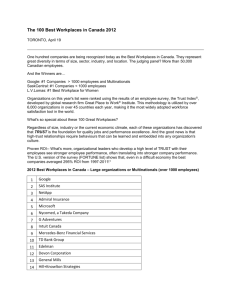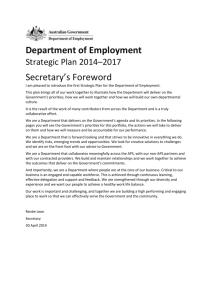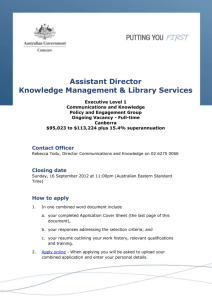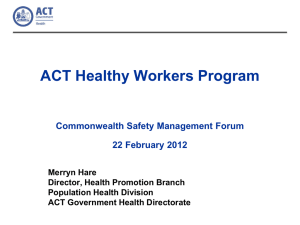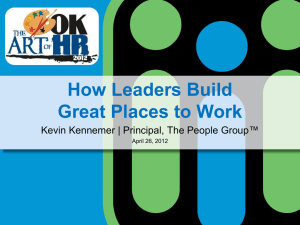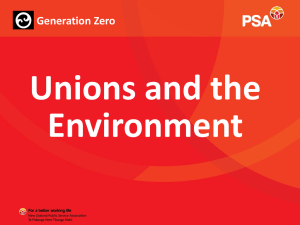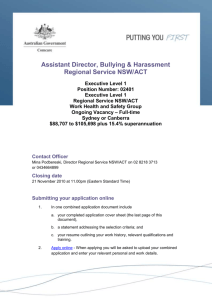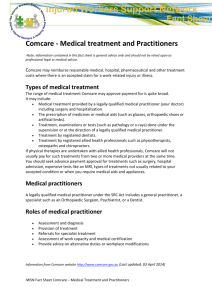Neil Quarmby
advertisement
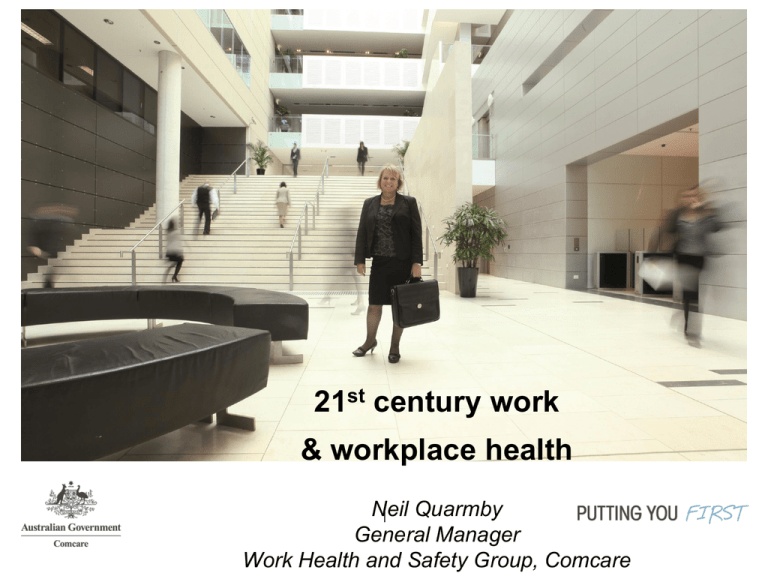
21st century work & workplace health Neil Quarmby 1 General Manager Work Health and Safety Group, Comcare Comcare’s Role Comcare partners with workers, their employers and unions to keep workers healthy and safe, and reduce the incidence and cost of workplace injury and disease. We implement the Australian Government’s policies in federal workplaces to drive social inclusion and productivity. MENTAL HEALTH we need to do more in workplaces • 1 in 5 people will experience a mental illness • 10% will be affected by anxiety disorder • 3% affected by psychotic illness • 7% will experience substance abuse disorders. • Workplaces are experiencing increasing costs & complexity of mental stress claims MENTAL HEALTH Increase in claims Since 2006-2008: • 54% increase in mental stress claims • 9% of accepted Australian Government Premium payer claims were attributed to mental stress • Around 11 per cent of all accepted claims within the Australian Government premium payers involved mental stress as either a primary or secondary condition. • 43 per cent of the total cost of accepted claims Accepted mental stress claims with one week or more lost time—Australian Government premium payers Average total cost* of mental stress claims (Australian Government premium payers) Work Pressure and Workplace Bullying • Bullying and harassment accounts for 44 per cent of psychological injury claims (up from 40 per cent in previous years) • Work Pressure accounts for 37 per cent of claims (this is down from 40 per cent) OUR OPPORTUNITITIES TO IMPROVE MENTAL HEALTH Australian workplaces face a new era • Harmonised Work Health and Safety laws –greater productivity and participation • Better health care, education and financial independence extend life course at work • Opportunities for innovative design shaping the way we do things and offering greater choice • Technology revolution – new possibilities for engagement and productivity • Changing expectations of work, flexibility, reward and engagement Bullying risk factors • Lack of awareness • Organisational change/changes in technology • Negative leadership styles • Lack of appropriate work systems • Poor workplace culture and relationships/disrespectful behaviors • Workforce characteristics Regulator role and expectations • Prevention of bullying and harassment in the workplace • Apply risk management principles • Current Comcare strategies • Workplace Relationships Resolution Team Prevention and early intervention MENTAL HEALTH AND WELLBEING CENTRE OF EXCELLENCE IN MENTAL HEALTH AND WELLBEING AT WORK Defining success Workplaces deliver the health benefits of good work and promote the health and wellbeing of their workers 1. Workplaces deliver the health benefits of good work and promote the health and wellbeing of their workers 2. Workplaces demonstrate a focus on mental health at work by establishing principles that are integrated into work design, people management practices, business processes, leadership and staff development programs. 3. Workplaces assess the risks to mental health and wellbeing and take action to continuously improve culture and systems at work. CENTRE OF EXCELLENCE 4. Managers have capability and support to help workers adapt to challenge and change and are held accountable for this work. 5. The work community is able to recognise early warning signs and people have the confidence and avenues to respond to mental ill health at work. 6. Managers seek to understand issues that may impact on individual’s ability to work and make adjustments to accommodate this. 7. People at work are involved in decisions on how their work is undertaken, including changes that affect them directly. CENTRE OF EXCELLENCE 8. People at work have guidelines, tools and support for performance improvement and are accountable for their behaviours. 9. Mental health and rehabilitation service are evidence based, improve functioning and foster participation in work. 10. People with longer term incapacity for work due to mental ill health are offered pathways back to employment. 11. Injured workers experience of the compensation process is supportive and not detrimental to mental health. 12. Injured workers’ have access to information and support to optimise their involvement in recovery and return to work CONCLUDE: SUPPORTING YOU in work health & wellbeing > Centre of Excellence > Healthy work initiatives > Disability confidence > Workplace Relationship Resolution > Case studies > Campaigns > Tools & Advice > 1300 366 979 > & under “Safety and Prevention” www.comcare.gov.au
